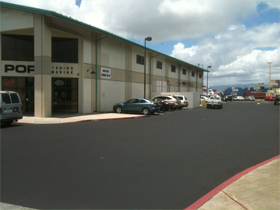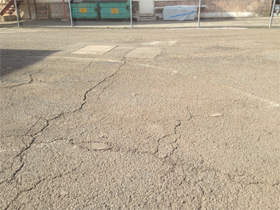Depending on who you talk to there are many answers to that question.
 Most people think that asphalt is what “black top” roads or parking lots are made of. That is partially correct. The material that the “black top” is made of is called asphalt concrete.
Most people think that asphalt is what “black top” roads or parking lots are made of. That is partially correct. The material that the “black top” is made of is called asphalt concrete.
Asphalt concrete is made up of gravel, sand, and asphalt cement. Everything is combined in a heated mixer and the mixture is laid down on the road and is compacted with a heavy roller to make the roads we drive on.
The asphalt cement is the glue that holds the gravel and sand together to make the “black top” roads and parking lots we drive on. But that begs the next question: “where does asphalt cement come from?”
There are two answers:
- Asphalt occurs naturally
- But more commonly, asphalt is manufactured by refining selected crude oil through a distillation process.
So when you drive on the “black top,” the asphalt is the glue that holds the gravel and sand together.
How your asphalt begins to degrade:
Asphalt actually starts out flexible. However, beginning immediately, exposure to the wind, sun, and rain causes the pavement to oxidize.
 As the asphalt ages it loses its flexibility and becomes brittle. When this happens, the asphalt starts to lose its ability to hold the gravel and sand together, and they become dislodged. That’s why you may see sand in your parking lot even though you’re nowhere near the beach! Then, when the gravel becomes dislodged and the asphalt becomes even more brittle, cracks form, and the life of the asphalt is coming to an end because it is losing its ability to carry the load of vehicles.
As the asphalt ages it loses its flexibility and becomes brittle. When this happens, the asphalt starts to lose its ability to hold the gravel and sand together, and they become dislodged. That’s why you may see sand in your parking lot even though you’re nowhere near the beach! Then, when the gravel becomes dislodged and the asphalt becomes even more brittle, cracks form, and the life of the asphalt is coming to an end because it is losing its ability to carry the load of vehicles.
As I mentioned previously, asphalt cement is commonly manufactured by refining selected crude oils through a distillation process. Due to its make-up, asphalt cement can also be degraded by oil. Thus, oil leaks from parked cars can dissolve the asphalt cement (the binder) and further cause your pavement to unravel and crack.
How to prevent your asphalt from degrading:
Now that you know what asphalt is and how it begins to degrade, we’ll tell you how you can protect it.
The idea is to take action while your pavement is in good condition. Don’t let it degrade to the point where you’re seeing large cracks, loose gravel, and sand in your parking lot. We’ve got a blog post with five easy tips to help extend the life of your pavement.
Learn 5 tips to extend the life of your pavement
Here’s a quick rundown of those five tips:
- Control the load on your pavement
- Fix drainage problems
- Sweep/blow your pavement
- Fix cracks
- Sealcoat
Remember, the longer you wait to take action, the more your parking lot will degrade and the more likely your maintenance cost will increase. Keep your good pavement good and you won’t need to worry!
